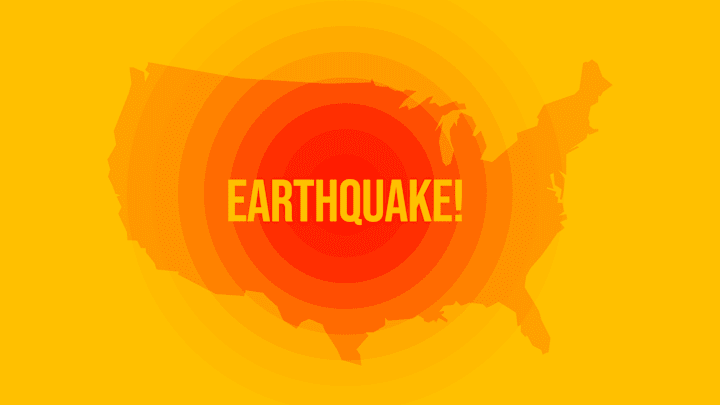An earthquake is taking place somewhere in the world right this second. Subterranean rock is naturally shifting, and a sudden jerk—what we know as an earthquake—can happen anywhere, anytime. Earthquakes cannot be predicted (yet), but are easy to track after the fact. The United States alone clocks more than 20,000 earthquakes a year. Most are smaller, lasting less than a minute, but the large, catastrophic ones (magnitude 8 and higher) occur globally about once per year.
With all that seismic activity happening at all times, you’re likely to have the earth shift beneath your feet at some point. Some areas are much more susceptible to rumblings—if you live in the U.S., this interactive map will show you the earthquake risk in your city—but everywhere and everyone is at vulnerable, according to the federal government’s emergency agency. This is why knowing what to do before, during, and after an earthquake is an essential skill to learn.
- How to Prepare Before an Earthquake
- Secure Your House
- Organize Your Home With Earthquakes in Mind
- Know Your Home
- Practice Earthquake Safety Drills
- Assemble a Disaster Kit
- How to Stay Safe During an Earthquake
- “Drop, Cover, and Hold on”
- If You Are Inside
- If You Are Outside
- If You Are in a Vehicle
- What to Do After an Earthquake
- Prepare For Aftershocks
- Provide Help, If Possible
- Inspect Your Surroundings
- Stay on Top of the News
- Know What to Avoid
- Be Prepared For Future Earthquakes
How to Prepare Before an Earthquake

1. Secure Your House
Hire a professional contractor to bolt your home to its foundation, reinforce walls, and repair any structural defects. Affix heavy furniture, like bookcases and your water heater, to wall studs, and be sure to trim tree branches. It’s also a good idea to buy earthquake insurance if you live in a high-risk area.
2. Organize Your Home With Earthquakes in Mind
Store heavy appliances on lower shelves and away from doorways. Hang art and mirrors away from seating areas and beds. Move beds away from windows. Add latches to your cabinets and secure breakable and flammable items inside them.
3. Know Your Home
Learn how to turn off your water and gas mains and circuit breaker. Teach your children how to operate your fire extinguishers.
4. Practice Earthquake Safety Drills
Come up with a readiness plan for you and your family. If you are inside your home, where will you seek cover? After the shaking stops, where will you meet?
5. Assemble a Disaster Kit
Fill a bag with non-perishable food, water, and camping supplies, such as flashlights, a battery-operated radio, goggles, and dust masks. Include any other personal and medical items you, your family, and your pets may need in an emergency. Also include cash and copies of important documents. You can make similar kits to store in your workplace, car, and near your bed.
How to Stay Safe During an Earthquake
6. “Drop, Cover, and Hold on”
This is the mantra that the CDC recommends for anyone stuck in an earthquake.
7. If You Are Inside
Move away from anything that can fall or break on you, including furniture, windows, light fixtures, and overhead cabinets. Stay in one room, and drop down to your hands and knees so you do not fall over. Seek shelter under a sturdy desk or table, or if none is available, against an interior wall. Cover your head and neck with your hands or a nearby book or pillow. Hold on and stay in place, indoors, until the shaking ends.
8. If You Are Outside
Get away from trees, overpasses, street lights, bridges, power lines, and buildings. Drop to your hands and knees and cover your head. Stay in place, outdoors, until the shaking ends.
9. If You Are in a Vehicle
Check that your seatbelt is buckled and drive away from those same outside obstacles. Once you are in a clearing close by, engage your parking brake and stay inside until the shaking ends.
What to Do After an Earthquake

10. Prepare For Aftershocks
These can happen at any moment, so be ready to drop, cover, and hold on again, even after the earthquake seemingly stops. If you live near water, the earthquake could have broken a dam or triggered a tsunami. Prepare for the possibility of flooding and landslides.
11. Provide Help, If Possible
Check yourself and the people around you for injuries. Put on shoes. If someone is hurt or trapped, administer first aid to those you can reach and then attempt to contact rescue services. Do not enter damaged buildings or any areas that look unsafe.
12. Inspect Your Surroundings
If you are inside, go outside to a clearing to assess impact and check your home for obvious damage. Beware when opening cabinets or closets, as items inside may have fallen. Put out any small fires with a fire extinguisher and clean up any small chemical spills. Call for emergency assistance for larger fires or spills. Inspect your utilities, sewer, and water lines and turn them off if you suspect leaks.
13. Stay on Top of the News
Listen to your radio for emergency instructions and updates on the situation. If you are in an area at risk for flooding, move to higher ground.
14. Know What to Avoid
Do not drive near bridges or overpasses until they have been assessed for damage. Also look for broken gas lines or downed power lines to avoid.
15. Be Prepared For Future Earthquakes
Once safe, call an inspector to your home to check for structural damage and hire a contractor to complete the repairs. Re-secure your home and refill your emergency kit so you are prepared in the event of another future earthquake.
Read More Stories About Natural Disasters Here:
A version of this story originally ran in 2017; it has been updated for 2024.
